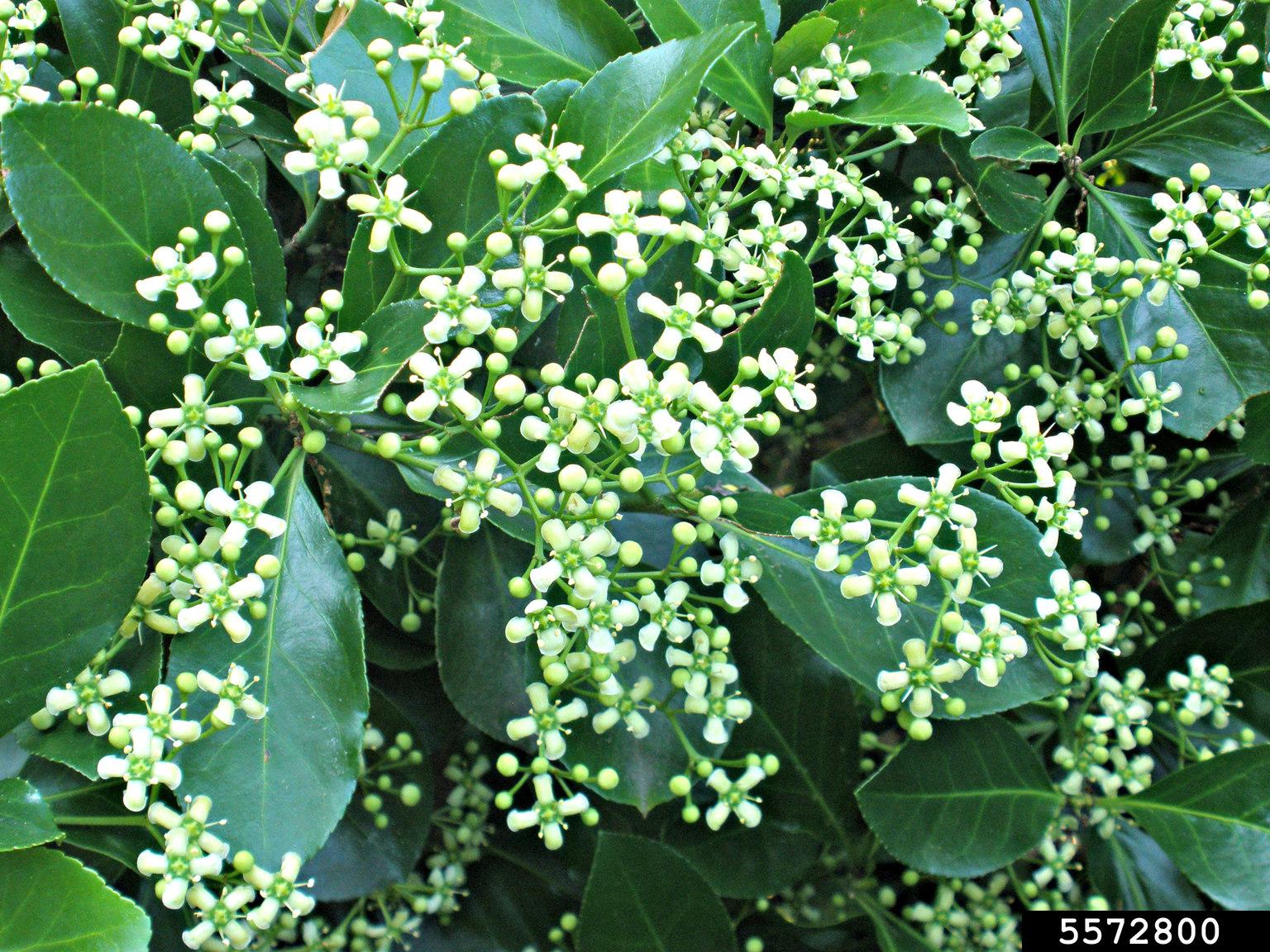About Winter Creeper (Euonymus fortunei)
Life cycle and background
Winter creeper euonymus (Euonymus fortunei), also called creeping euonymus, is a perennial plant that grows as a groundcover, climbing vine, or sprawling shrub. It was introduced from China in 1907 for use as an ornamental evergreen groundcover. In 1994, the Maryland Department of Natural Resources reported it as being invasive in natural areas of Maryland. The Maryland Department of Agriculture (MDA) named winter creeper a Tier 1 invasive plant, as of February 2018. This classification means that a person may not propagate, import, transfer, sell, purchase, transport, or introduce any living part of a Tier 1 invasive plant in the state of Maryland. Refer to the MDA website for additional details.
Invasive Plants to Avoid Buying for your Yard and Garden in Maryland
Growth habit
Winter creeper euonymus is highly variable in its growth habit and appearance. Leaves are evergreen, about 1 inch or less in length, crenate-serrate along the margin, and arranged oppositely along the stem. Leaf color is variable, usually dark green with silver-toned veins. Climbing stems form aerial roots, similar to English ivy
Winter creeper can be 4-12 inches tall as a groundcover or as high as 70’ as a climbing vine. These plants can also grow in the form of mounding, woody shrubs. The groundcover form restricts the growth of native terrestrial plants and the vining form can climb and kill small trees.


Reproduction
Adult plants produce a ⅓” diameter pinkish capsules that open to expose orange seeds in October-November. Birds and other animals aid in seed dispersal. Winter creeper also spreads vegetatively from the roots.

Conditions that favor growth
Tolerates heavy shade to full sun and variable soil conditions.
What to plant instead
Bearberry (Arctostaphylos uva-ursi)
Controlling winter creeper euonymus
Additional resources
Burrell, C. Colston. 2007. Native Alternatives to Invasive Plants. Brooklyn Botanic Garden.Kaufman, Sylvan Ramsey & Wallace Kaufman. 2007. Invasive Plants: Guide to Identification and the Impacts and Control of Common North American Species.
Maryland Biodiversity Project, Winter Creeper.
Swearingen J., K. Reshetiloff, B. Slattery, and S. Zwicker. 2002. Plant Invaders of Mid-Atlantic Natural Areas. National Park Service and U.S. Fish & Wildlife Service, Washington, DC.
Compiled by Christa Carignan, reviewed by Debra Ricigliano, University of Maryland Extension, 9/2018.
Still have a question? Contact us at Ask Extension.
 English
English العربية
العربية Български
Български 简体中文
简体中文 繁體中文
繁體中文 Hrvatski
Hrvatski Čeština
Čeština Dansk
Dansk Nederlands
Nederlands Suomi
Suomi Français
Français Deutsch
Deutsch Ελληνικά
Ελληνικά हिन्दी
हिन्दी Italiano
Italiano 日本語
日本語 한국어
한국어 Norsk bokmål
Norsk bokmål Polski
Polski Português
Português Română
Română Русский
Русский Español
Español Svenska
Svenska Català
Català Filipino
Filipino עִבְרִית
עִבְרִית Bahasa Indonesia
Bahasa Indonesia Latviešu valoda
Latviešu valoda Lietuvių kalba
Lietuvių kalba Српски језик
Српски језик Slovenčina
Slovenčina Slovenščina
Slovenščina Українська
Українська Tiếng Việt
Tiếng Việt Shqip
Shqip Eesti
Eesti Galego
Galego Magyar
Magyar Maltese
Maltese ไทย
ไทย Türkçe
Türkçe فارسی
فارسی Afrikaans
Afrikaans Bahasa Melayu
Bahasa Melayu Kiswahili
Kiswahili Gaeilge
Gaeilge Cymraeg
Cymraeg Беларуская мова
Беларуская мова Íslenska
Íslenska Македонски јазик
Македонски јазик יידיש
יידיש Հայերեն
Հայերեն Azərbaycan dili
Azərbaycan dili Euskara
Euskara ქართული
ქართული Kreyol ayisyen
Kreyol ayisyen اردو
اردو বাংলা
বাংলা Bosanski
Bosanski Cebuano
Cebuano Esperanto
Esperanto ગુજરાતી
ગુજરાતી Harshen Hausa
Harshen Hausa Hmong
Hmong Igbo
Igbo Basa Jawa
Basa Jawa ಕನ್ನಡ
ಕನ್ನಡ ភាសាខ្មែរ
ភាសាខ្មែរ ພາສາລາວ
ພາສາລາວ Latin
Latin Te Reo Māori
Te Reo Māori मराठी
मराठी Монгол
Монгол नेपाली
नेपाली ਪੰਜਾਬੀ
ਪੰਜਾਬੀ Afsoomaali
Afsoomaali தமிழ்
தமிழ் తెలుగు
తెలుగు Yorùbá
Yorùbá Zulu
Zulu ဗမာစာ
ဗမာစာ Chichewa
Chichewa Қазақ тілі
Қазақ тілі Malagasy
Malagasy മലയാളം
മലയാളം සිංහල
සිංහල Sesotho
Sesotho Basa Sunda
Basa Sunda Тоҷикӣ
Тоҷикӣ O‘zbekcha
O‘zbekcha አማርኛ
አማርኛ Corsu
Corsu Ōlelo Hawaiʻi
Ōlelo Hawaiʻi كوردی
كوردی Кыргызча
Кыргызча Lëtzebuergesch
Lëtzebuergesch پښتو
پښتو Samoan
Samoan Gàidhlig
Gàidhlig Shona
Shona سنڌي
سنڌي Frysk
Frysk isiXhosa
isiXhosa